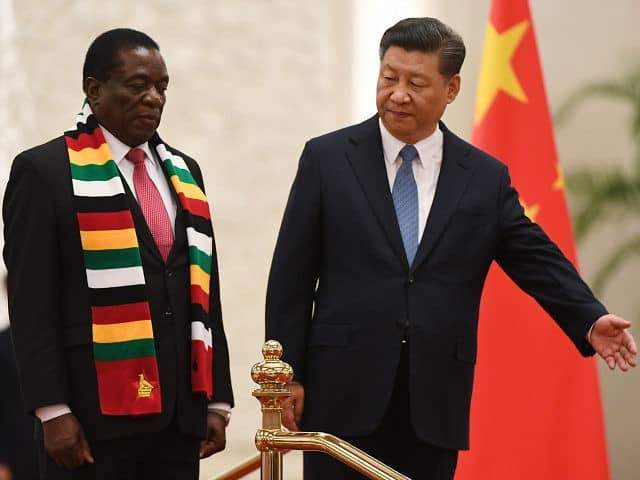Chinese Mining Companies Destroy Roads, Pollute Towns in Zimbabwe

Villagers in Makwa, Zimbabwe, have expressed outrage at Chinese mining companies for damaging a town road so severely that it has been described as a “death trap,” the New Zimbabwe reported Sunday.
Villagers have also alleged that the companies are polluting the town’s bodies of water and otherwise ravaging the locals’ quality of life, the outlet noted.
Chinese mining companies have damaged the Deka Road, which connects various parts of Zimbabwe including the popular tourist destination Victoria Falls, so much so that a man reportedly died recently after driving over a pothole and flipping his vehicle.
“Villagers from Mashala and Simangani wards depend on the road and soon will be weaned off the whole district because soon the road will become totally unsafe to use,” one villager named Fortune Mwembe told the New Zimbabwe. “The road is now dangerous and might cause accidents.”
Village leader Rosemary Shoko told the local media outlet that the community is extremely concerned about the road, especially as so few people are benefiting from the work of those companies. Another issue is the damage and pollution done to the local environment as effluent enters the rivers, affecting the safety of fish stocks.
“The road was destroyed by mining companies that operate in the area,” she said. “What worries people is that our resources are being destroyed yet only less than 10 percent of locals are employed by those companies. They are causing pollution, livestock and fish are dying on a daily basis. Soon we will be an island because of the lack of road.”
“Fish is the source of employment for our people as every family has a member who does fishing along the Zambezi River and Deka. Livelihoods will be affected,” Shoko continued.
Amid rising anger over the situation, villagers have demanded that the town’s authorities and representative in parliament take concrete action to resolve the issue. Should they fail to act, locals have warned they may resort to vigilante justice, though they have not specified any particular action.
The incident is the latest in a long line of problems caused by Chinese companies operating in Zimbabwe as Beijing aggressively capitalizes on the country’s rich natural resources and its troubled economy to advance its own economic, political, and military aims. Such campaigns are typically marketed under the guise of the “Belt and Road Initiative,” China’s supposed global infrastructure and development strategy.
Anger over the behavior of Chinese companies has risked boiling over in recent months not just with regards to environmental standards, but also to their treatment of local workers. In June, the Zimbabwe Congress of Trade Unions (ZCTU) pledged to launch a global campaign against Chinese involvement in Zimbabwe should their companies continue failing to adhere to basic workers’ rights.
Tensions over labor conditions were highlighted in July when a Zimbabwean worker was shot and seriously wounded by his Chinese employer following a heated dispute over wages. The man has since initiated legal proceedings in the hope of receiving compensation.
In September, Zimbabwe’s socialist president, Emmerson Mnangagwa, took the unprecedented step of banning all mining from national parks amid concerns that it was threatening various endangered species. The Chinese embassy in Harare claimed to welcome the new regulation as it provided clarity on the limits of their mining activity.
Photo: GREG BAKER/AFP via Getty Images
Link: https://www.breitbart.com/africa/2020/12/07/chinese-mining-companies-destroy-roads-pollute-towns-zimbabwe/




